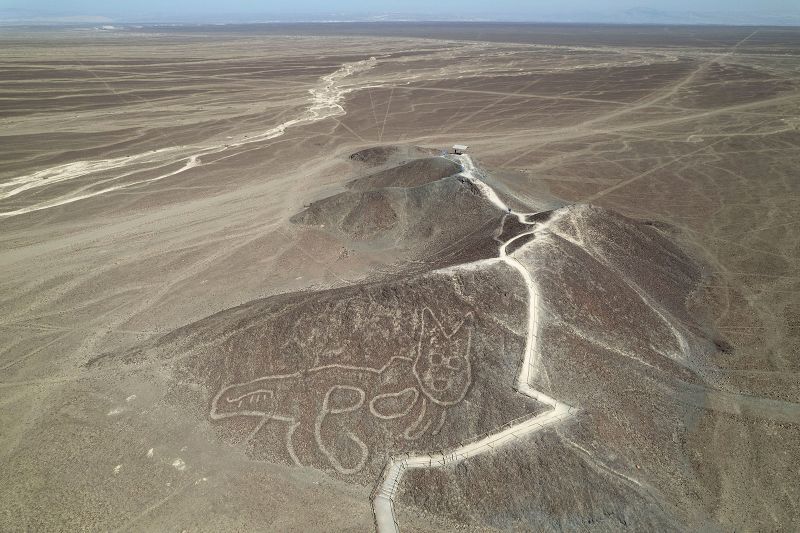Peru’s decision to shrink its archeological park home to the famous Nazca Lines by around 42% — an area roughly the size of 1,400 soccer fields — has sparked alarm among conservationists, archaeologists and environmental advocates.
Critics say the rollback paves the way for informal mining and weakens decades of cultural and ecological protection, while the government says the adjustment reflects updated scientific studies and does not compromise the UNESCO World Heritage status or the site’s core protections.
“The reduction not only removes protections — it does so precisely where extractive activity is expanding,” said Mariano Castro, Peru’s former vice minister of the environment, adding that the decision could cause “very serious risks and cumulative damage,” as it excludes zones with active or pending mining claims.
Castro added that safeguards for archaeological heritage during the formalization of artisanal mining are already limited.
“This is made worse by the ministry of culture’s failure to consider the cumulative impact of dozens or even hundreds of mining operations on sensitive archaeological zones,” he said.
The area in question forms part of a UNESCO-recognized World Heritage Site, home to the Nazca Lines — massive geoglyphs etched into the desert thousands of years ago — and one of Peru’s most fragile desert ecosystems.
UNESCO told The Associated Press it hasn’t been notified by Peruvian authorities of any changes to the boundaries of the World Heritage site, which are crucial for its protection. The organization will request more information from the authorities.
Peruvian environmental lawyer César Ipenza, who has closely followed the decision, said the resolution has already been approved and that it reduces the Nazca zone by more than 1,000 hectares.
“This is a weakening of both environmental and cultural protections,” Ipenza said. “The state should be upholding its commitments under international agreements, not yielding to private interests.”
Ipenza and others say the rollback reflects a pattern of regulatory concessions to mostly informal gold miners.
“There’s an alliance between the current government and informal mining sectors,” he said. “The legal framework continues to be relaxed to benefit them.”
Peru’s ministry of culture, which decided on May 30 to reduce the Nazca reserve from about 5,600 square kilometers to roughly 3,200 square kilometers, declined to answer specific questions from the AP. Instead, it sent a press release saying the adjustment was based on updated archaeological studies and does not affect the UNESCO World Heritage designation or its buffer zone.
The ministry said it remains committed to preserving the site’s cultural heritage through regulated management.
A day after the May 30 decision, Peru’s Minister of Culture Fabricio Valencia acknowledged that illegal mining exists within the reserve.
“Unfortunately, informal mining is an activity present in this area, but the measure we have taken does not mean it will be encouraged, nor that the likelihood of any harm from informal mining will increase. That will not happen,” Valencia said on RPP, one of Peru’s largest radio programs.
When asked for more details about the presence of illegal activity in the reserve, Valencia said, “there are some mining deposits, but I don’t have exact information on what type of mineral is there.”
Castro, the former vice minister, warned the move could violate Peru’s own laws.
“It contravenes Article 5(h) of the Environmental Impact Assessment Law, which mandates the protection of archaeological and historical heritage,” he said.
Ipenza said the government is enabling illegality under the guise of technical adjustments.
“It is shameful to forget our ancestors and our heritage, and to disguise decisions that pave the way for sectors seeking to impose illegality, such as illegal and informal mining,” he said. “This decision benefits those groups and harms all Peruvians.”
